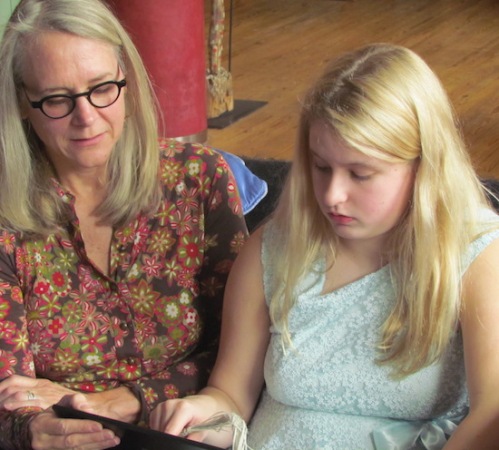Ariane: What should we start our day with? German, a blog post, general writing, fiction, poetry or something else?
Emma: Just start with blog post.
A: What would you like to post about this morning?
Emma: How about the topic: Knowing many things, but having no one believe you are able to understand.
Ariane: This is a great topic! Do you want me to say anything or keep quiet so you can continue?
Emma: I will continue.
For many years this was the title of my life. It was long hours bloated with mindless screams of nonsensical searing memory words that no one understood the significance of. The feeling of pleased joy when another believes, and then astounds the non believers by interacting with their knowing, is like beams of brilliant light shouting through the dreary darkness. Diving heavy waters it cannot be described, but the word coming closest is love, and to all who cannot believe in what they do not understand, try to be silent for years without words meaning what you have been taught. This might help the misunderstood.
Ariane: Wow, Emma, that’s really beautiful. What else?
Emma: You can add commentary now.
Ariane here adding commentary, which is a little like being asked to perform after The Rolling Stones just rocked the house…
I am always struck by Emma’s words. It is the force with which she writes and the compelling word choices she makes that convey a depth of emotion, an intensity and complexity of feelings, as well as insights that make me stop and reread her words over and over. This paragraph took about forty-five minutes for her to write, not because she edited or had to go back and rewrite, but because that is how long it took for her finger to locate the correct key one letter at a time.
“Nonsensical searing memory words…” I so want to know more about this. Does she mean the often repeated sentences that are about the past, the words I once assumed were simply memories thrusting themselves front and center? A kind of Möbius strip of thought, like an infinity symbol wrapping around and around itself? I have learned to reside in the unknowing, the discomfort of being unsure, the scratchy realization that I cannot ever truly know, though I can make guesses and then ask if these are correct. I no longer assume words spoken are meaningless or simply memories or are scripts that are being blurted out compulsively and without thought. I’ve written about these bridges before ‘here‘. Those words and sentences that are full of meaning, but whose meaning is not immediately apparent to me upon first hearing.
“… that no one understood the significance of.” I will ask her about this later. She used the past tense and that makes me hopeful that we are not continuing this kind of awful misunderstanding. “…beams of brilliant light shouting through the dreary darkness.” Who among us does not want that feeling for those we love? Is this not what love is? Connection with another?
“… to all who cannot believe in what they do not understand, try to be silent for years without words meaning what you have been taught. This might help the misunderstood.”
Those who think being silent for an hour or two will give them any real insight into what it is like to not have words readily available, either by writing or speaking, cannot possibly understand. We must shift our thinking beyond the hour or two, beyond the day, beyond a month, but instead try years. Years of opening your mouth to speak, but having words tumble forth that are not what you intended, or saying something you intend only to have it misunderstood, or repeating a memory because it conveys so much that is relevant to the NOW only to be asked to discuss more about that particular memory and not what it signifies, it’s deeper meaning. To say words, to write words only to be told you do not understand metaphor. To reach out in vain to connect with a world that continually turns its back or mouths that smile with faces flooded with fear, or superiority or judgement or intolerance or disgust.
End of commentary.
Ariane: What sort of image should we put with this post?
Emma: How about a photo of the two of us. Daddy can take it.
Ariane: I was thinking we could title this post: “Knowing Many Things” and the Impact of Disbelief From Others. What do you think?
Emma: No.
Ariane: Okay. What would you like the title to be?
Emma: The Impact of Believing in Incapability

February 3, 2015









